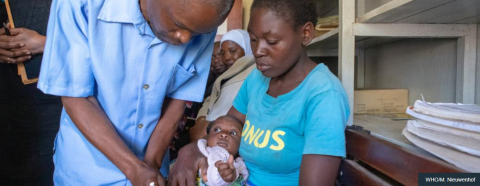Geneva, 23 April 2019 – The RBM Partnership to End Malaria welcomes the phased introduction of the RTS,S malaria vaccine in Malawi followed by Ghana and Kenya in the coming weeks. Used alongside bed nets, insecticide spraying, diagnostics, and drugs – the vaccine has the potential to strengthen malaria control efforts in Africa and save tens of thousands of young children.
Dr Abdourahmane Diallo, CEO, RBM Partnership to End Malaria, said:
“Global investments in innovation and new tools and strategies to fight malaria have led to tremendous progress and saved millions of lives. The RTS,S vaccine is an important new tool that can help save tens of thousands of children from malaria, and a powerful example of the role country leadership and multi-sectoral partnerships play in accelerating malaria elimination.
Defeating malaria requires that everyone – government leaders, community health workers, mothers and fathers – takes personal responsibility to achieve zero malaria. The RBM Partnership commends the governments of Malawi, Ghana, and Kenya for taking ownership of the malaria challenge and committing to protect their communities and countries from this preventable and treatable disease.”
RTS,S is the first and, to date, the only vaccine to show partial protection against malaria in young children. Malaria is disproportionately deadly for young children. While not a perfect vaccine, rigorous clinical testing has shown its potential to boost malaria prevention and save lives.
The vaccine will be deployed in selected areas of moderate-to-high malaria transmission through routine immunization services. This pilot programme will provide crucial information and lessons for the vaccine’s future deployment.
Since 2000, global efforts to expand access, scale up and distribute life-saving bed nets, diagnostic testing, and effective antimalarial treatments has saved seven million lives and prevented more than one billion cases of malaria.
Despite this historic progress, malaria remains a significant public health concern threatening half the world’s population. Greater than 60% of the 435,000 people who died of malaria in 2017 were children under the age of five. Therefore, even a partially effective malaria vaccine for young children, when combined with other proven malaria prevention measures, could save thousands of lives and further drive down the malaria burden in the most vulnerable population – children under the age of five.
The malaria vaccine implementation programme is a country-led, WHO-coordinated initiative. It is a collaborative effort between Ministries of Health in Malawi, Ghana and Kenya and a range of in-country and international partners, including PATH, a non-profit organization, and GSK, the vaccine manufacturer.
Financing for the vaccine pilot programme has been mobilized by a multi-sectoral partnership among three key health funding bodies: Gavi, the Vaccine Alliance, the Global Fund to Fight AIDS, Tuberculosis and Malaria, and Unitaid, with support from the World Health Organization.
Notes to editors
To arrange an interview or find out more about the launch of vaccine please contact the RBM Partnership press office at Grayling on RBMPartnership@grayling.com or call +44 (0) 20 3861 3747.
About the RBM Partnership to End Malaria
The RBM Partnership to End Malaria is the largest global platform for coordinated action against malaria. Originally established as Roll Back Malaria (RBM) Partnership in 1998, it mobilises for action and resources and forges consensus among partners. The Partnership is comprised of more than 500 partners, including malaria endemic countries, their bilateral and multilateral development partners, the private sector, nongovernmental and community-based organisations, foundations, and research and academic institutions. www.endmalaria.org
